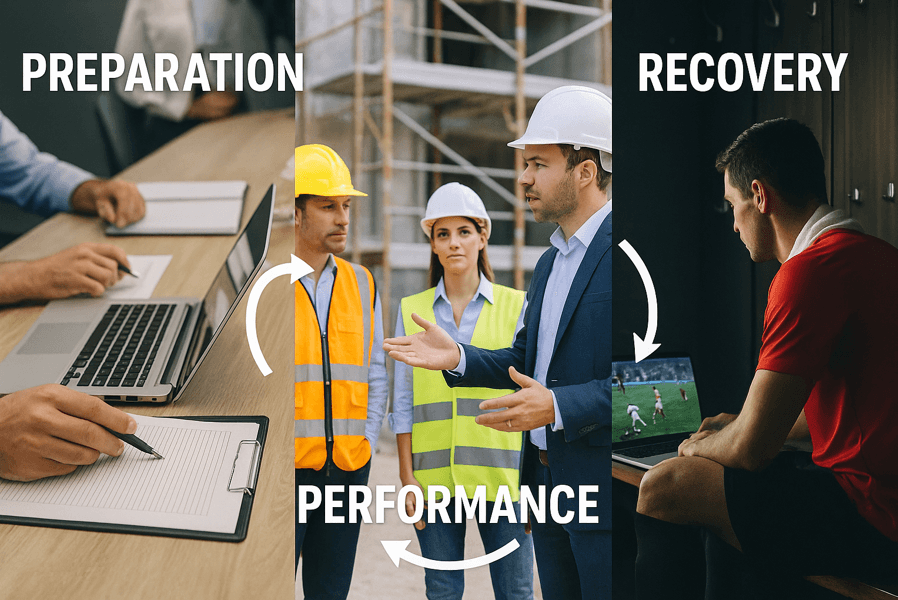Why You Should Treat Your Career Like an Elite Athlete Treats Their Sport

Why You Should Treat Your Career Like an Elite Athlete Treats Their Sport
If I’m brutally honest about my own career, my 20s were more about chasing pay packets and enjoying the weekends than consciously building a profession. I had stepped onto the escalator, but without much direction. When I moved to Australia in my 30s, I became a manager, went on a few leadership courses, and started learning the ropes of people management. But again, my focus was short term: make money, manage the team, and enjoy the lifestyle.
Only later did it click that I was holding myself to a lower standard than the footballers, rugby players, and cyclists I criticised from the couch. I’d shake my head at a sluggish striker or a poorly prepared rugby player, yet I’d stroll into work under slept, under-prepared, and hoping things went my way. Heaven forbid if I read about a sports performer being out on the town until the early hours - what kind of professional parties three days before a derby match? The penny dropped after conversations with CEOs, business coaches, and high performers on The Building Talks Podcast, as well as in my day-to-day discussions with business leaders as a recruiter. If athletes are expected to prepare, fuel, train, behave impeccably in their spare time, and recover with discipline, why should we expect anything less from ourselves in our careers?
The Sporting Parallel
Elite athletes are not judged just on game day. Their success is built on everything outside the spotlight: nutrition, sleep, stretching, breathing, hydration, mindset, reviewing past performances, and setting tiny incremental goals. Sir Dave Brailsford, the performance director who turned British Cycling (more recently high-performance guru for Manchester United – whose improvements are still in the pipeline!) into a powerhouse, called it the “aggregation of marginal gains.” His approach was simple: find 1% improvements in dozens of areas, and the sum of those micro-gains becomes a game-changer.

Career Awareness – More Than Buzzwords
After 20 years and 4,000 interviews, I’ve heard the same lines roll off candidates’ tongues: “I’m a team player. I’m organised. I work hard. I build relationships.” All fine qualities — but they don’t demonstrate value.

Employers, particularly in construction and property, want evidence. If you’re a Contract Administrator, don’t just say you “build relationships.” Say you’ve worked closely with facade and structural subcontractors to identify risks early and avoid costly project delays. If you’re a Project Manager, don’t just say you “deliver projects.” Be able to explain how you turned a forecasted loss into a profit by renegotiating contracts, resolving design errors, or securing variation approvals worth half a million dollars. That’s tangible. That shows return on investment.
And here’s the part too many miss: being able to admit where you’ve gone wrong, what you learned, and what you changed. Counterintuitively, that honesty builds more trust than the polished clichés ever will. Managers and interviewers can smell spin. They respect someone who owns their weaknesses and shows they’re actively improving.
Preparation, Performance, Recovery (PPR)
This is where I lean on a framework shared by business coach Mick Hawes, who joined me on The Building Talks Podcast. Mick teaches a simple cycle used by elite performers: Preparation, Performance, Recovery.

- Preparation is more than just skimming your emails before a meeting. It’s the planning, the mental reset, the technical sharpening, the sleep the night before, the small rituals that set you up. In sport, this is the training session and the diet. At work, it’s building an agenda, reviewing contract details, or practising a presentation.
- Performance is the moment itself: the site meeting, the board presentation, the negotiation with a subcontractor. This is your “game day.”
- Recovery (or Reflection) is the piece most professional’s skip. After the meeting or project milestone, do you reflect on what went well, what could be improved, and how you’ll do it differently next time? Athletes review game footage religiously. Too many professionals move on without extracting the lessons.
Run this loop consistently and you’ll separate yourself from colleagues who are “busy” but never improving.
Where Self-Improvement Fits In
If this sounds a little like self-help, that’s because it is. But it doesn’t need to be fluffy. Think about the “miracle morning” (I recommend “The Miracle Morning” By Hal Elrod, as well worth a read/listen if you’re looking to fire up your morning routine) routines you see written about endlessly: exercise, cold plunges, journalling, reading, hydration. Whether you embrace all of them or just a few, the principle is the same; set yourself up to win before the day starts.

Some practical applications for our industry:
- Hydration and sleep: Obvious but often ignored. Turning up sharp beats dragging yourself through a fog.
- Micro-learning: A LinkedIn Learning course, a podcast episode, or a chapter of a book daily. Ten minutes of new input compounds over a year
- Morning clarity: Even writing down your three must-do tasks before the day starts can stop you being pulled in ten directions.
- Stress management: Do you have a strategy when things get tough - breathing, a short walk, or a reset? Or do you just let stress dictate your behaviour?
High performers treat these habits as non-negotiables. They don’t wait for burnout to course-correct.
Why It Matters
The harsh truth is that not everyone will stay employed when the market tightens. Lesser performers often find themselves on the sidelines. But high performers, those who can clearly demonstrate value, build trust, and show consistent improvement, well, they remain in demand and likely always will do (regardless of economic circumstances). Salaries don’t go backwards for these people, and career and job opportunities flow to them.
Treating your career like an elite sports person does not mean becoming robotic. It means deliberately building habits and awareness, so your strengths are clear, your weaknesses are managed, and your managers trust you. It means building consistency, not relying on bursts of intensity.
As Mick Hawes said on my podcast, “It’s about preparation, performance, and recovery - repeat that cycle in everything you do.” That’s how athletes succeed. And it’s how you’ll turn a patchy, reactive career into one that progresses, grows, and withstands the ups and downs of our industry.
So, next time you find yourself shaking your head at a sports star for turning up unprepared (or read about their misdemeanours in the media), ask yourself: am I holding myself to the same standard in my career?